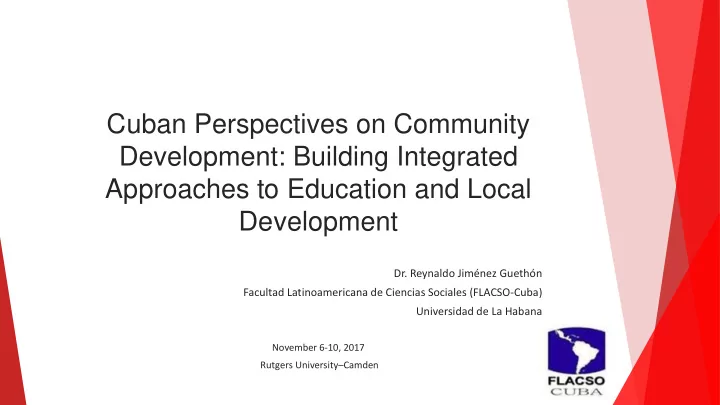

Cuban Perspectives on Community Development: Building Integrated Approaches to Education and Local Development Dr. Reynaldo Jiménez Guethón Facultad Latinoamericana de Ciencias Sociales (FLACSO-Cuba) Universidad de La Habana November 6-10, 2017 Rutgers University–Camden
Defining Local Development Local Development is a process that capitalizes on local strengths and advantages to: minimize obstacles achieve socio-economic growth and, positively transform the levels of equity and well-being of a given place Local Development promotes social participation by strengthening the institutions and local actors to foster progress that leads to economic sustainability.
Local Development Strategies Providing Opportunities: National and local institutions guarantee access of social actors to opportunities that are grounded on quality and equitable growth. , Empowerment of Local Actors: It evolves through a decentralized process that distributes functions, authority and resources. Strengthening and Rescuing a Local Economy: Increase local economic power to generate income streams and governmental resources and jobs that foster sustainability and self-sufficiency. Resource Allocation: Guarantees economic and social security to meet the basic social and economic needs that are necessary to live productive and dignified (Espina, 2006).
Growing importance of the citizenship and engagement in the local economy, neighborhood revitalization and sustainability of housing and infrastructure
Transdisciplinary approach Transdisciplinary learning processes are necessary to align the work to the local context by integrating diverse disciplines and the voice, knowledge and experiences of all stakeholders including producers, farmers, managers (Nuñez, 2013).
Strengths of Local Development in Cuba Availability of a basic infrastructure for services. Highly qualified human capital throughout the country. Free access to universities, research centers and other organizations which offer education and training to multiple constituents. Availability of valuable reserves that can be mobilized and managed at the municipal level to provide viable resources.
Challenges for Good Local Development Need for greater participation of community members in decision-making. Better use of innovation and knowledge to reduce the expenditures for local businesses. Need for diversification of local economy. Increase the empowerment of women through access to better employment opportunities.
Education in Cuba The education system is 100 % subsidized by the government. Cuban students at all levels can attend school for free.
Education must: Respond to the real needs of the country and community and provide diversified programs to meet the needs of every community member and that of new members. Be considered a productive investment, rather than an ordinary accounting expense.
Role of Education in Local Development: Raise the awareness of people about their role in ensuring the collective social and economic growth and development. Meet both the social and economic needs of people and communities. Build the capacity of members of the community for decision-making, problem solving and efficient management that leads to collective prosperity.
Cooperative education "Cooperative education includes the development, dissemination and acquisition of new knowledge and skills by the members of a cooperative to facilitate their roles as productive community members. It promotes the cooperative values of solidarity, cooperation, autonomy, democracy, collectivism and equality (Jiménez, 2005). It facilitates the integration and alignment of people, place and community.
Role of Cooperative Education in Community Development: Collective awareness about community development and development strategies. Institution building in alignment with community needs. Integrated approaches that combine qualitative and quantitative measures for development. Build capacity of community members and partners to increase management efficiency and timely decision making for the common good.
Role of Latin American Faculty of Social Sciences (FLACSO-Cuba) in Education Foster postgraduate research and teaching about Cuban society through the development of multi and interdisciplinary perspectives that can contribute to solving community and societal problems and trajectories. Advance academic knowledge in critical areas of development at the national, regional and international levels.
FLACSO and Education: Concrete Actions Master's Degree in Social Development Master's Degree in Management and Development of Cooperatives Specialization in Local Community Development Support for training and formation processes in communities and municipalities in different territories of the country.
Project Santo Ángel. (FLACSO students have conducted studies on this community project. )
Recommend
More recommend